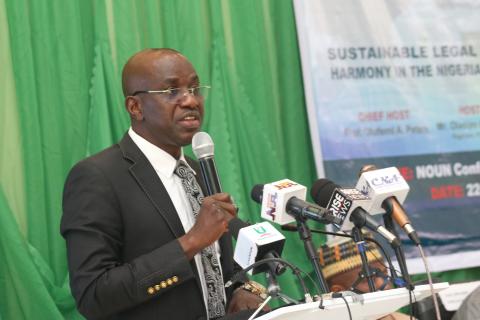
Stakeholders in the education sector have emphasised the roles of registrars across the Nigerian universities toward the revolution of academic institutions
They stated this at a Second Registrars Workshop and the 75th Business Meeting held under the theme: “Sustainable Legal Framework as Panacea for Industrial Harmony in The Nigerian Universities System: Challenges and Remedies,”organised by the Association of Registrars of Nigerian Universities (ARNU) in conjunction with the National Open University of Nigeria (NOUN).
The event, held between April 22 – 27, 2024 at the NOUN headquarters in Abuja welcomed prominent education stakeholders, where in his keynote address, a Senior Advocate of Nigeria (SAN), Professor Dakas C.J. Dakas, said university registrars serve as the custodians of institutional records, guardians of academic integrity, and stewards of administrative processes.
Their role, according to him, extends far beyond administrative tasks as they are pivotal in shaping the legal framework that governs universities and directly influences industrial harmony within the system.
“I charge you to deeply reflect, and take concrete action, on innovative ways to engender a future where our universities thrive as beacons of knowledge, innovation, and industrial harmony, bolstered by sustainable legal frameworks.
“Registrars are at the heart of academic integrity. It is in their names that admission letters go out, among many other roles in the Universities. You must build the capacity of the young people under you,” Dakas told the gathering.
According to him, Registrars play a crucial role in shaping the legal landscape of the Nigerian university system and fostering industrial harmony.
He acknowledged challenges that exist, but put hope on the prospects for success if they remain committed to collaboration, innovation, and continuous improvement.
Dakas also highlighted some of the key obstacles faced by university registrars as: Complex Regulatory Environment, Resource Constraints, Resistance to Change and Conflicting Stakeholder Interests, among others.
He also emphasised that Strategic Leadership, Capacity Building, Collaborative Governance, Innovative Solutions are some of the promising prospects for university registrars to drive positive change and engender industrial harmony through a sustainable legal framework.
To ensure effectiveness and relevance, the Nigerian university system, which serves as the cornerstone of intellectual development, research, and innovation within the country must operate within a framework that fosters industrial harmony for a delicate balance between the needs of all stakeholders, including students, faculty, administrators, and the government, he said.
“The heart of this framework lies the concept of sustainability—creating a system that can endure and thrive in the face of challenges, while also promoting fairness, equity, and progress. The legal framework plays a pivotal role in achieving this goal by providing clear guidelines, mechanisms for dispute resolution, and avenues for continuous improvement,” Dakas added.
On his part, the Chairman/CEO, National Salaries, Incomes and Wages Commission, Ekpo Nta, in his presentation titled: “Equitable Reward and Wage System as Catalysts for Quality Service Delivery in the Nigerian University System,” stated that in fashioning out an equitable rewards system as catalysts for quality service delivery in the Nigerian university System several prerequisites have to be in place.
“These must largely originate from within the university system, and since it is a human resources schedule, it should be guided by the administrative arm which is the office of the Registrar,” Nta said.
He further stated that “university staff can earn more than what is currently being paid if the university system re-invents itself to prudently manage its: available infrastructure – lands, laboratories, grasses, etc, Manpower, Students and Relationship with industry Strengthen Performance Management and Invest in Capacity Building.”
Speaking on his paper titled: “Managing Role Conflicts in the Contemporary Nigerian University System,”the NOUN’s Deputy Vice-Chancellor, Academic, Prof. Chiedu Mafiana, identified common conflicts in high places as: Authority and Decision-Making, Policy Implementation, Communication Issues, Regulatory Compliance, among others.
According to Mafiana, managing role conflicts involves strategies and skills that balance conflicting roles and reduce stress for the ultimate growth of the university.
It is all about limiting the negative aspects of conflict while promoting the positive aspects including problem-solving, new ideas, commitment and better decisions or outcomes.
“Role conflicts within our university system arise from diverse expectations and responsibilities placed on us by the circumstance of offices we occupy,”he added.
He highlighted ways to managing the role conflicts as: Prioritise/Clarify Roles, Flexibility /Adaptability/Support, Open Communication Conflict, among others.
Other resource persons include: Director, Institute of Governance and Policy and Development Studies, Nasarawa State University (NSUK), Keffi, Prof. Andrew Ezadueyan Zamani, who presented a paper titled: Revisiting the Issues of University Administrators ‘Healthy Living in the Milieu of Socio-Economic Challenges in the Nation and Mrs. Helen Nguper Nyitse, Immediate-past Registrar, Joseph Sarwuan Tarka University, Makurdi, whose presentation was on: Registrars as Custodians of Rules and Regulations Governing Tertiary Institutions in Nigeria: A Critical and Pragmatic Review.
Meanwhile at the end of the workshop, certificate of participation was issued to all participants.

